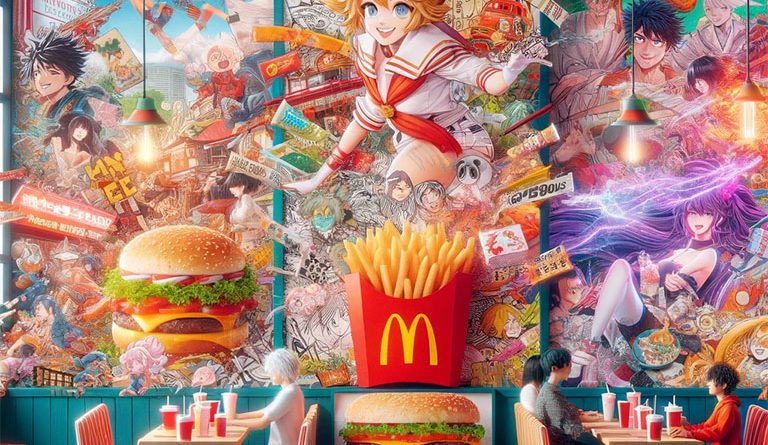McDonald’s WcDonald’s: A Masterclass in Engagement
In an era where brands vie for not just the attention but the affection of their audiences, McDonald’s recent “WcDonald’s” campaign stands as a testament to the power of embracing pop culture and fan-generated content. This innovative marketing strategy, drawing from the brand’s fictional depiction in anime and manga, marks a significant pivot in how global brands engage with their consumers.
McDonald’s WcDonald’s Campaign: A Masterclass in Fan Engagement and Trend Integration
For decades, the fast-food giant McDonald’s has found itself whimsically reimagined as “WcDonald’s” within the colorful worlds of anime and manga, a playful nod that avoided direct trademark infringement while still evoking the iconic brand. Recognizing the affectionate tribute, McDonald’s, in a stroke of marketing genius, decided to bring this parallel universe to life. The campaign launched globally, introducing a new sauce, packaging, and episodic content inspired by the anime and manga depictions of the brand.
Collaboration was key to the authenticity and success of the WcDonald’s campaign. McDonald’s teamed up with Japanese artist Acky Bright, known for his manga illustrations, to develop packaging that not only captivated the audience but also functioned as a gateway into the WcDonald’s universe. Each piece of packaging could be scanned to reveal a cast of characters from the WcDonald’s world, enhancing consumer engagement through technology. Furthermore, the partnership with Studio Pierrot, a titan in the anime industry, for the creation of a four-episode anime series, underscored McDonald’s commitment to authentic storytelling.
Engaging Fans Through Immersive Experiences
The WcDonald’s campaign was not confined to the visual and digital realms. McDonald’s took the experience offline with an immersive dining experience in Los Angeles. This event, reservable via OpenTable, promised a deep dive into the anime-inspired universe of WcDonald’s, featuring 360-degree projection mapping and immersive tabletop projections. This blend of digital innovation with physical dining created a multi-sensory experience that resonated with fans and newcomers alike.
The WcDonald’s campaign illustrates the importance of embracing and integrating fan cultures and trends into marketing strategies. By acknowledging the fan-created “WcDonald’s” and bringing it into the real world, McDonald’s not only paid homage to its fans’ creativity but also tapped into the vast and passionate anime and manga community. This approach demonstrates a shift towards marketing strategies that are collaborative, participatory, and deeply rooted in existing cultural conversations.
Lessons for the Food Industry: Innovation Through Cultural Engagement
The success of the WcDonald’s campaign offers several key takeaways for other food manufacturers. Firstly, engaging with pop culture and fan content can transform brand perception and relevance. Secondly, innovative packaging and immersive experiences can significantly enhance consumer engagement. Additionally, this campaign showcases the importance of sustainability, ethics, and emotional connection in modern marketing strategies. By aligning a brand with the values and interests of its consumers, companies can foster deeper loyalty and engagement.
The WcDonald’s campaign’s global launch underscores the universal appeal of innovative and culturally resonant marketing strategies. By adapting a concept that originated from fan culture and is beloved in numerous markets, McDonald’s demonstrated the potential of cultural marketing to transcend geographical boundaries. This global rollout not only amplified the campaign’s impact but also reinforced McDonald’s position as a brand that values innovation, creativity, and global community engagement.
Looking Ahead: The Future of Food Marketing and Fan Engagement
As we look to the future, the intersection of food marketing and fan engagement appears more vibrant and vital than ever. The WcDonald’s campaign serves as a blueprint for how brands can leverage cultural trends and fan content to create marketing strategies that are not only innovative but also deeply engaging. Whether through immersive experiences, strategic partnerships, or digital storytelling, the key lies in recognizing and embracing the passions and interests of consumers.
The McDonald’s “WcDonald’s” campaign is a pioneering example of how food and beverage companies can excel by integrating fan cultures and contemporary trends into their marketing strategies. This approach not only sets a new standard for consumer engagement but also paves the way for future innovations in the industry. As brands continue to navigate the ever-evolving landscape of consumer preferences, the lessons from McDonald’s innovative campaign will undoubtedly inspire a new wave of marketing strategies that are creative, culturally aware, and deeply engaging.
